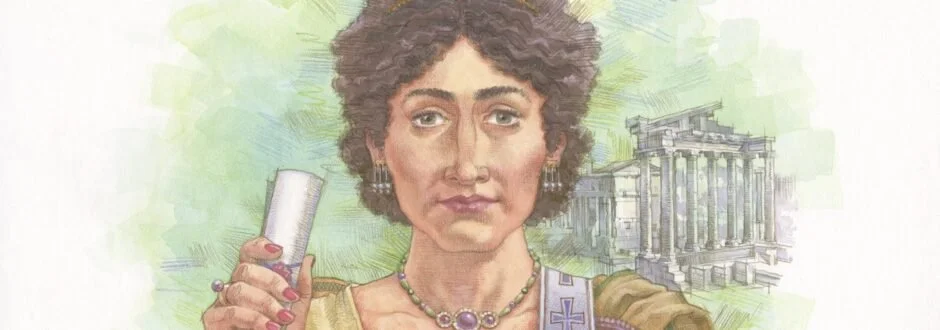Dr Phyllis Zagano. PHOTO: The Good Oil/supplied.
The question of whether women can be ordained as deacons in the Catholic Church is expected to be discussed further at this year’s Second Session of the Synod on Synodality, with two prominent advocates for women deacons hopeful that it will be the catalyst for change, reports The Good Oil.
American academic Dr Phyllis Zagano and Australian Sister of Mercy Elizabeth Young have both argued in favour of the historical reality of women deacons and the need for such an ordained ministry for women in the Church today.
They say the Synod offers a real opportunity for the Church to discern a way forward to the restoration of women to the ordained diaconate at a time when they are needed more than ever.
In 2016, the International Union of Superiors General asked Pope Francis to appoint a commission to study the question. There was no published outcome, and in 2020, Pope Francis named a new commission, which met in 2021 and 2022. The report of this commission has not been published either.
Phyllis, who was a member of the first commission, is Senior Research Associate-in-Residence and Adjunct Professor of Religion at Hofstra University in the US. She said that since she first published on the topic of women deacons in 2000, “there has certainly been a lot of conversation about restoring women to the ordained diaconate”.
Image of St Phoebe the Deacon © Terry St Ledger 2023. Used with permission courtesy of the Sisters of the Good Samaritan.
In a recent article published in The Australasian Catholic Record (ACR), Phyllis wrote that Australian Catholics had made clear both in the consultations for the Fifth Plenary Council of Australia and the Synod on Synodality that the Church could and should restore women to the ordained diaconate.
She pointed to one of the decrees confirmed at the Plenary Council: “That, should the universal law of the Church be modified to authorise the diaconate for women, the Plenary Council recommends that the Australian Bishops examine how best to implement it in the context of the Church in Australia.”
Furthermore, the Instrumentum Laboris for the First Session of the Synod on Synodality said that worldwide, “Most of the continental assemblies and the synthesis of (the reports of) several Episcopal Conferences call for the question of women’s inclusion in the diaconate to be considered. Is it possible to envisage this, and in what way?”
The Synthesis Report at the end of the First Session in October last year noted that different positions had been expressed regarding women’s access to the diaconal ministry and that synod members requested “wider ongoing reflection on the theology of the diaconate”. It asked that continued theological and pastoral research on the access of women to the diaconate should be presented at the next session of the Synod, and that such research should include the results of the two papal commissions.
“The Synod, as it has progressed since October 2021, has increasingly refined the discussion about restoring women to the ordained diaconate,” Phyllis told The Good Oil.
“And” she wrote in the ACR, “the point of the Synod on Synodality is for the Church to recognise its needs, perhaps reclaim the past, and in hope recognise possibilities for the future”.
In Australia, Sister Elizabeth Young RSM has taken a leading role in the conversation about ordained women deacons, establishing the Liturgy on the Margins website to promote discussion on diaconal ministry, and speaking at public events on the issue.
Sr Elizabeth Young RSM. PHOTO: The Good Oil/supplied.
Elizabeth said that, inspired by the positive example of religious leaders in her upbringing in the Uniting Church and then the Catholic Church, she felt called to permanent ordained ministry at age seven, a call which has “kept nudging” since then.
Over the years since joining the Sisters of Mercy she has continued to be drawn to roles in chaplaincy, parish ministry, and liturgical ministry, “which looked similar to the roles of the deacon”.
Elizabeth said it was clear that many religious were not at all interested in ordained ministry and that while their roles and tasks might overlap, they were quite distinct.
However, for those who did feel called to the ordained diaconate, the opportunity should be available for women and men and, while the historical and Biblical evidence for women deacons was important, the diaconate should be shaped for the needs of today.
“Ordained ministry looked quite different then (in Biblical times), and was responsive to the local needs and situations,” she said. “There were many different roles that were carried out by women as well as men who were deacons. However, when the diaconate was brought back for men as a permanent vocation after Vatican II, it was not introduced based on earlier models but developed into what we have today.”
Elizabeth said that the discussion of the women’s diaconate at the Synod on Synodality was enormously encouraging.
“Yes, traction is being gained, but there are significant roadblocks,” she said. “Some think that it is too difficult to do, some think that the Church needs to be perfect before it can be done. Some think that there is too much focus on women as deacons when women have many vocations.
“I believe that we need to encourage all vocations of all people but enable those with the requisite gifts and passion to follow God’s call in official, sanctioned Church ministry.
“My hope (for the Synod) is that the voices from the margins can be heard, with their needs for official pastoral ministry and sacramental care. And also, the voices of women, ready to step up and serve, with the strength of the Holy Spirit and the blessing of the Church.”
This is an abridged form of a feature article by Debra Vermeer published in The Good Oil, the e-news publication of the Sisters of the Good Samaritan. Read the full article here.



